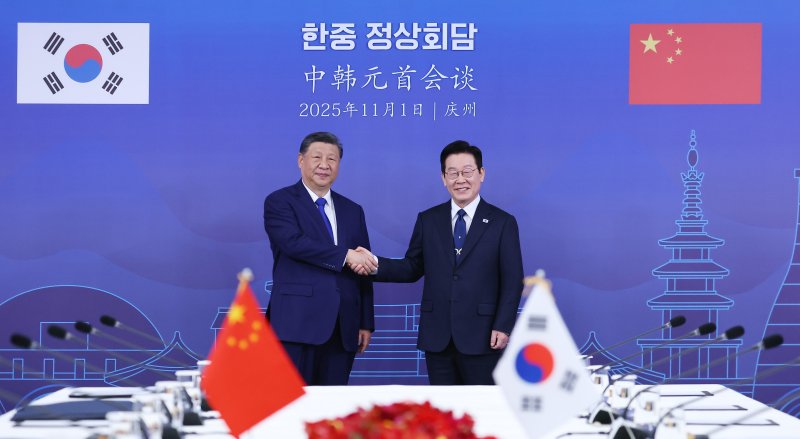70 Trillion Won–Yuan Swap and Only 6 MOUs Signed... Lifting the Ban on Korean Content Remains a Challenge [South Korea-China Summit]
- Input
- 2025-11-02 18:25:54
- Updated
- 2025-11-02 18:25:54

According to the Presidential Office on the 2nd, President Lee and President Xi held a ceremony to exchange MOUs and agreements in Gyeongju, North Gyeongsang Province, on the sidelines of the Asia-Pacific Economic Cooperation (APEC) summit the previous day. The two countries signed a five-year Korean won–Chinese yuan currency swap agreement worth 70 trillion won (approximately 400 billion yuan) between their central banks. Since first signing a currency swap agreement worth $2 billion in 2002, the two countries have gradually extended the contract period and increased the scale. Most recently, a swap agreement worth 400 billion yuan was signed in 2020, but it expired on the 10th of last month. The renewed Korean won–Chinese yuan currency swap is expected to contribute to the stability of both countries’ financial and foreign exchange markets and promote trade.
South Korea and China also signed a Memorandum of Understanding (MOU) on the joint economic cooperation plan, which sets a long-term direction for mutually beneficial cooperation. In addition, an MOU was signed to strengthen exchanges and cooperation in service trade, supporting the institutional foundation for economic cooperation through substantive progress in the Free Trade Agreement (FTA) negotiations on services and investment.
Wi Sung-lac, Director of the National Security Office, stated, "President Xi explained the Chinese economy and spoke a lot about domestic demand, referring to what China calls 'dual circulation.' He discussed boosting domestic demand and enhancing international connectivity. Both sides expressed interest in domestic demand and the public welfare economy. They agreed to seek common ground and aim to conclude FTAs in the service and investment sectors."
To promote future-oriented cooperation that will have a tangible impact on the lives of their citizens, South Korea and China also signed MOUs on cooperation in the silver industry and innovative startups, as well as on facilitating the export of Korean agricultural products to China. President Lee emphasized, "Both countries, having achieved economic development through joint efforts, agreed on the need to share capabilities and open a new path of mutually beneficial cooperation. We will further increase necessary communication between the two countries and swiftly enhance the required systems to broaden cooperation, especially in the service and investment sectors."
The police authorities of both countries also signed an MOU for joint response to voice phishing (vishing) and online scam crimes, establishing a foundation for cooperation against transnational scam crimes. President Lee stated, "Both countries have pledged to respond jointly and strongly to transnational crimes, such as scam crimes, that threaten the lives of citizens across borders. As the history of APEC has proven, cooperation and solidarity between our countries will make the daily lives of our peoples richer and safer."
Although the lifting of the ban on Korean content in China was discussed during the South Korea-China summit, no definitive answer was given. There was also consensus on the need to resolve issues related to Hanwha Ocean sanctions and West Sea structures, but no concrete solutions were reached. Wi Sung-lac said, "We also discussed the ban. While there was a consensus to promote more cultural exchanges and cooperation, and to make efforts regarding content, due to domestic legal regulations, a perfect agreement was not reached, but there was progress. I believe we can coordinate further through practical communication."
South Korea and China agreed to ensure that the development of bilateral relations contributes meaningfully to both public welfare and peace. Accordingly, both sides agreed that North Korea–United States dialogue is of utmost importance and will work to create a favorable atmosphere. Wi Sung-lac stated, "President Lee introduced our government's vision for denuclearization and peace, and requested China's constructive role in resuming dialogue with North Korea. President Xi also responded that China will continue efforts to resolve issues on the Korean Peninsula and to maintain peace and stability."
syj@fnnews.com Seo Young-jun, Sung Seok-woo Reporter